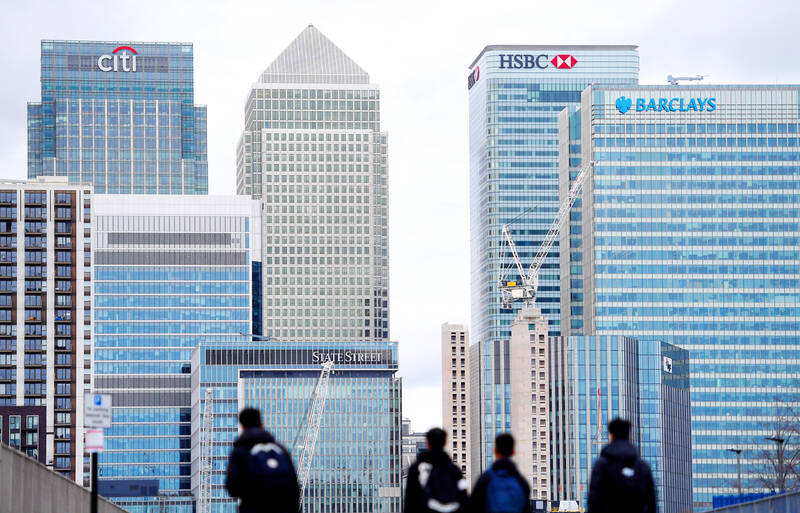European and London shares on Friday fell, erasing their early gains, while some logged their steepest weekly drop in five months as supportive measures from regulators across the US and Europe failed to allay fears over a brewing global banking crisis.
The pan-European STOXX 600 closed down 5.33 points, or 1.21 percent, at 436.31, dragged by bank, insurance and financial services stocks.
The bank index lost 2.6 percent, with HSBC Holdings PLC, BNP Paribas, Allianz SE and UBS Group AG losing 1 percent to and 3 percent.

A US$30 billion lifeline by large U.S. banks for embattled lender First Republic Bank, less than a day after battered Credit Suisse Group AG clinched a mega central bank loan, had boosted the bank index by as much as 2.2 percent earlier in the day.
Later in the day, SVB Financial filed for a court-supervised reorganization under Chapter 11 bankruptcy protection to seek buyers for its assets.
“Central banks have done the right things in putting an effective backstop in place ... it’s just going to take some time,” said Jeffrey Kleintop, chief global investment strategist at Charles Schwab & Co.

Photo: EPA-EFE
Euro zone inflation eased a touch last month, figures showed on Friday, but underlying price growth continued to accelerate on a surge in services costs.
“The core CPI is still climbing, making it unclear when the hiking cycle will end ... there are some concerns about what will these global central banks do,” Kleintop added.
The benchmark STOXX 600 lost 3.84 percent this week, with bank stocks bleeding 11.5 percent, after the US and European lenders’ meltdown left investors panicking about the financial sector’s health.
Credit Suisse, too, reversed early gains and dropped 8 percent, following a 19 percent rise in the previous session.
In London, the blue-chip FTSE 100 lost 74.63 points, 1.01 percent, to close at 7,335.40, while the mid-cap FTSE 250 lost 287.75 points, or 1.53 percent, to close at 18,470.83.
British banks fell 2.6 percent, with major lenders including HSBC, Barclays and Standard Chartered PLC down from 1.9 percent to 2.8 percent.
“The market has been flip-flopping over these bank stories about whether there can be risk of contagion from SVB or Credit Suisse,” HYCM chief market analyst Giles Coghlan said.
“They [markets] are still concerned that there’s going to be further defaults from some other unknown source,” he said.
The international-focused FTSE 100 posted its worst weekly performance, down 5.33 percent, while the FTSE 250 lost 4.58 percent for the week.

To many, Tatu City on the outskirts of Nairobi looks like a success. The first city entirely built by a private company to be operational in east Africa, with about 25,000 people living and working there, it accounts for about two-thirds of all foreign investment in Kenya. Its low-tax status has attracted more than 100 businesses including Heineken, coffee brand Dormans, and the biggest call-center and cold-chain transport firms in the region. However, to some local politicians, Tatu City has looked more like a target for extortion. A parade of governors have demanded land worth millions of dollars in exchange

Hong Kong authorities ramped up sales of the local dollar as the greenback’s slide threatened the foreign-exchange peg. The Hong Kong Monetary Authority (HKMA) sold a record HK$60.5 billion (US$7.8 billion) of the city’s currency, according to an alert sent on its Bloomberg page yesterday in Asia, after it tested the upper end of its trading band. That added to the HK$56.1 billion of sales versus the greenback since Friday. The rapid intervention signals efforts from the city’s authorities to limit the local currency’s moves within its HK$7.75 to HK$7.85 per US dollar trading band. Heavy sales of the local dollar by

Taiwan Semiconductor Manufacturing Co’s (TSMC, 台積電) revenue jumped 48 percent last month, underscoring how electronics firms scrambled to acquire essential components before global tariffs took effect. The main chipmaker for Apple Inc and Nvidia Corp reported monthly sales of NT$349.6 billion (US$11.6 billion). That compares with the average analysts’ estimate for a 38 percent rise in second-quarter revenue. US President Donald Trump’s trade war is prompting economists to retool GDP forecasts worldwide, casting doubt over the outlook for everything from iPhone demand to computing and datacenter construction. However, TSMC — a barometer for global tech spending given its central role in the

An Indonesian animated movie is smashing regional box office records and could be set for wider success as it prepares to open beyond the Southeast Asian archipelago’s silver screens. Jumbo — a film based on the adventures of main character, Don, a large orphaned Indonesian boy facing bullying at school — last month became the highest-grossing Southeast Asian animated film, raking in more than US$8 million. Released at the end of March to coincide with the Eid holidays after the Islamic fasting month of Ramadan, the movie has hit 8 million ticket sales, the third-highest in Indonesian cinema history, Film